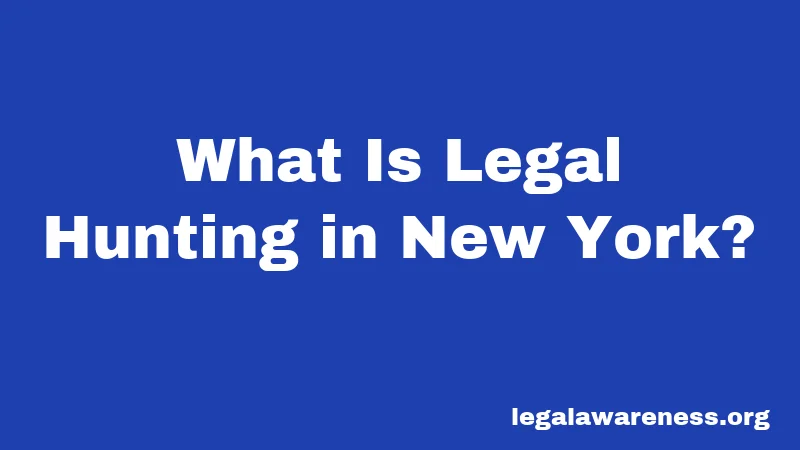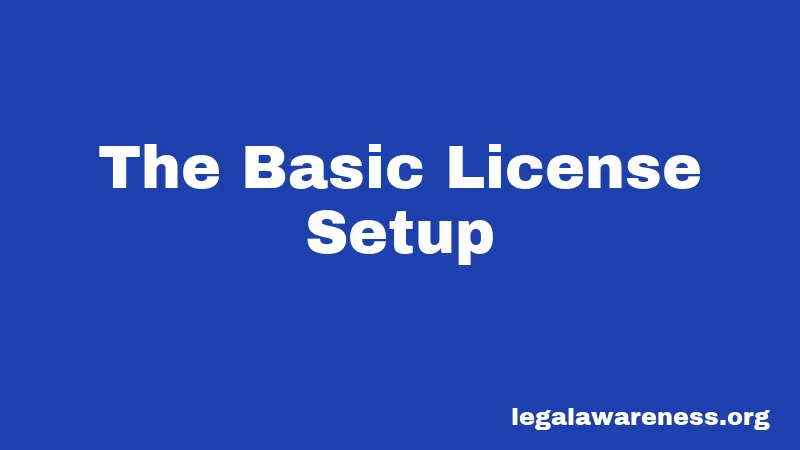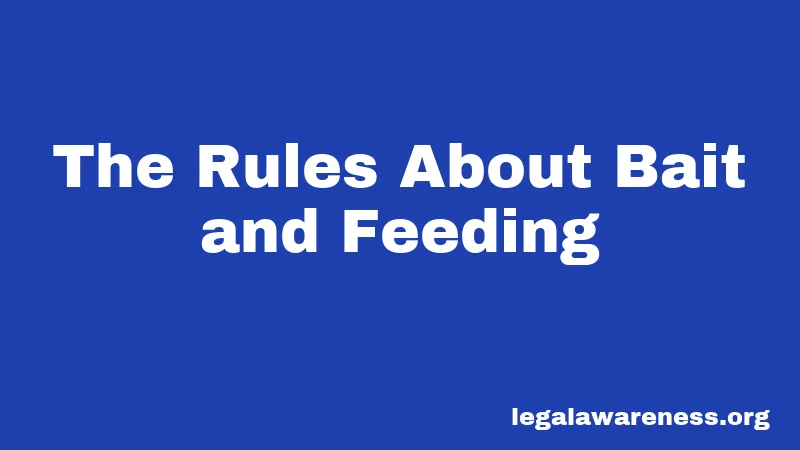New York Hunting Laws in 2026: The Complete Seasonal Guide
Most people think hunting rules are all the same everywhere. They’re not. New York has some of the most detailed hunting regulations in the country. If you’re planning to hunt here this season, you need to know the rules. This guide breaks down everything you need to know about New York hunting laws for 2025-2026.
Trust me on this—getting the details right matters. Violating hunting laws can lead to serious penalties. Let’s walk through what you need to know to stay legal and safe.
What Is Legal Hunting in New York?

Legal hunting means pursuing game animals during specific seasons. You follow the rules about where, when, and how you hunt. Sounds simple? Here’s where it gets interesting.
New York divides the state into zones with different hunting dates. The Northern Zone has different seasons than the Southern Zone. Counties like Westchester and Suffolk have their own special rules. You could have a legal hunt one county over. In your county, that same hunt could be illegal.
Why all these rules? New York manages wildlife populations carefully. Hunting laws help keep animal numbers healthy. They also keep hunters safe.
You Need a License to Hunt in New York
Okay, here’s the first big rule. No hunting without a license. Seriously. There are almost no exceptions.
All hunters born after September 1, 1949, must complete hunter education first. Yes, really. This applies to anyone starting to hunt. You can take the course online or in person. The online course costs $24.95 and takes about 4-6 hours. In-person courses are free and take at least 7 hours.
A friend asked me why the education requirement is so strict. Here’s the thing—hunting accidents happen. Training prevents most of them. That’s why New York requires it.
After you finish education, you buy your hunting license. Licenses go on sale in early August. For the 2025-2026 season, they’re valid from September 1, 2025, through August 31, 2026. You can buy them online, by phone, or at license-issuing agents.
The Basic License Setup

So you’re wondering what license to buy? Let’s break this down.
A base hunting license covers small game and furbearers. But if you want to hunt deer, bear, or turkey, you need special add-on privileges. These are extra permissions you buy along with your base license. Each privilege costs extra money.
Bowhunting privileges are necessary if you want to use a bow. Muzzleloader privileges are required for muzzleloader seasons. Crossbow hunters need bowhunting privileges too.
Here’s where things get interesting. New York just passed a major law about crossbows. Crossbows are now legal during all bowhunting seasons. Think of it like opening a whole new door for hunters who can’t pull back a compound bow anymore. The law removed old restrictions on crossbow design. You just need the bowhunting privilege to use one.
Deer Season: It’s More Complex Than You Think
White-tailed deer hunting is the biggest hunting season in New York. But honestly? The rules are pretty detailed. Stay with me here.
New York splits the state into the Northern Zone and Southern Zone. Each zone has different season dates. Westchester County and Suffolk County have completely separate seasons. Check your specific area before heading out.
In the Northern Zone, bow season starts September 27, 2025. The regular firearms season begins October 25. In the Southern Zone, bow season starts October 1. Firearms season begins November 15. See the difference?
Antlered deer (males with 3-inch antlers or longer) have different limits than antlerless deer. You can take one antlered deer per license year statewide. Antlerless deer depend on your zone and which tags you have.
Not sure what counts as an antlered deer? Just measure the antlers. If both antlers are at least 3 inches long, it’s antlered. If the antlers are shorter, it’s antlerless.
Deer Management Permits, or DMPs, let you take extra antlerless deer. Think of them like bonus tags. You can apply for DMPs every year. The application deadline is October 1. Some hunters get lucky and get selected. Others don’t. It’s a random drawing.
The Rules About Bait and Feeding

Hold on, this part is important. It’s illegal to hunt over bait in New York. Many hunters don’t realize this until they get caught.
It’s also illegal to put out salt blocks or mineral licks for deer. Even if you’re just trying to attract deer for observation, it’s against the law. And feeding deer? That’s illegal too. Some commercial attractants might look innocent, but the law is strict about what’s allowed.
Let me be honest—this rule confuses a lot of people. You’re allowed to scout an area and place tree stands. You’re allowed to create food plots for wildlife. But you can’t put out bait to concentrate animals right before hunting them.
Turkey Hunting: Two Seasons, Two Different Approaches
New York offers both spring and fall turkey hunting. Pretty straightforward, right? Not exactly.
Spring turkey season runs statewide north of the Bronx. You hunt from half an hour before sunrise until noon. Spring hunting is mostly in upstate New York.
Fall turkey season is divided into six zones. Fall hunting hours run sunrise to sunset. Fall seasons are completely different from spring. You won’t use the same calls. You won’t use the same strategies.
Here’s the key difference. Spring turkeys respond to hen calls. You’re trying to attract breeding males called gobblers. Fall hunting is totally different. You break up flocks and try to call them back together. It’s a completely different hunting experience.
Bear Hunting: Not for Everyone
Black bear hunting is available in parts of New York, mostly in the Adirondacks and Catskills. Not everybody can hunt bear. You need a big game license with bear privileges.
Early bear season runs in September. During early season, you can use a bow, crossbow, muzzleloader, handgun, shotgun, or rifle (where permitted). Regular season runs later. Check your specific zone because dates vary quite a bit.
The limit is usually one bear per license year. But you can only hunt bears in areas where the season is open. If you live in Long Island or NYC, there’s no bear season at all. If you live in Westchester or Suffolk, there’s no bear season either.
Waterfowl and Other Migratory Birds
Ducks, geese, and other migratory birds have their own complex season. All waterfowl hunters must register with the federal Harvest Information Program, or HIP. Yes, federal. New York doesn’t control these seasons—the U.S. government does.
Waterfowl seasons vary by region. Bag limits are strict. Breaking these rules can result in federal penalties on top of state penalties.
Special Rules About Hunting Methods
Okay, pause. Read this carefully.
You cannot hunt big game with artificial lights. No lasers. No spotlights. A small flashlight to navigate to your hunting spot is allowed. But once you’re hunting, lights are out. This includes deer and bear.
You can use electronic calls for deer and furbearers. But electronic calls are illegal for turkeys, ducks, and geese. Breaking this rule gets you a fine.
Dogs are allowed for hunting in some situations. But in the Northern Zone, you can’t carry a rifle larger than .22 rimfire or a shotgun loaded with slug or buckshot while with a dog. Exception: coyote hunting under a permit.
Firearm Transport Rules
Here’s one hunters often miss. A firearm in a vehicle must be unloaded in both the chamber and magazine. Your crossbow must be unloaded with no bolt nocked. No exceptions.
If you’re in a motorboat and legally hunting migratory game birds, you can carry a loaded shotgun. That’s the only exception for loaded firearms in vehicles.
If you leave a firearm unattended in a vehicle, it must be locked in a secure storage repository. If an adult stays with the gun, you don’t need special storage. But if nobody’s watching it, lock it up.
Hunting While Under the Influence
This rule might seem obvious, but people break it. You cannot hunt while intoxicated or impaired. Whether it’s alcohol or drugs, if it affects your ability to hunt safely, it’s illegal.
Think about why this matters. You’re carrying firearms or bows. You’re making split-second decisions. Impairment puts you and everyone around you at risk. New York takes this very seriously.
The Backpack Change That Surprised Everyone
Okay, this one’s good news. As of recent law changes, you don’t need backtags anymore. Backtags were orange tags you wore on your back while hunting. Many hunters are relieved about this change.
But here’s the catch—you still need to properly tag your animals. Instead of wearing a backtag, carcass tags must be attached to the animal you harvest. Regulations are strict about this, so follow the rules carefully.
Penalties for Breaking Hunting Laws
Now we get to the serious stuff. Breaking hunting laws has real consequences.
Violations range from small fines to serious jail time. The penalty depends on what you did and whether you’ve violated before.
Minor violations might cost you $250 to $1,000. But serious violations can result in fines up to $2,500. Some violations also mean jail time. We’re talking up to one year in prison for serious violations.
Here’s where it gets tougher. If you hunt while your license is suspended or revoked, it’s a misdemeanor. You could face up to 90 days in jail, a $1,000 fine, or both.
Court also adds mandatory surcharges. These are extra fees on top of fines. Surcharges add $25 to $100 depending on the violation.
Want to know the worst part? If you gained money or property from breaking the law, the court can fine you even more. Maybe you sold illegal game or equipment. The court can impose much larger fines in those cases.
License Revocation Is Real
Hunting violations can result in losing your hunting privileges. This isn’t temporary. A revoked license means you can’t hunt. Period.
Some violations lead to revocation for a set time. Others are permanent revocations. That means you might never hunt legally in New York again.
Before you think “it won’t happen to me”—lots of people thought the same thing. Hunting violations happen more often than you’d think.
Special Permits and Exceptions
Certain hunters qualify for special permissions. Native Americans hunting on reservation lands don’t need a license. Free licenses are available to members of specific tribes (Shinnecock, Unkechaug, and Six Nations). Contact the DEC at 518-402-8843 for details.
Active service members of the National Guard or certain Armed Forces units get free licenses. Resident farmers and immediate family members can hunt small game on farmland without a license.
These exceptions exist, but don’t assume you qualify. Check with the DEC if you think you might be eligible.
Youth Hunters Get Special Opportunities
New York wants to get young hunters interested. That’s why there’s a special youth big game hunt weekend. This typically happens in early October before the regular season.
Youth hunters aged 12-15 get their own turkey season too. These programs help introduce the next generation to hunting. Plus, successful youth hunters who don’t have another tag available might get bonus tags for the regular season. That’s a new rule designed to keep young people engaged.
Hunter Education Is Mandatory for Beginners
Honestly, this is probably the most important thing. If you’ve never hunted in New York before, you must complete hunter education.
You can take the online course ($24.95, takes 4-6 hours) or attend an in-person class (free, but takes at least 7 hours). Some courses split across multiple days. In-person courses include a field day where you practice with actual equipment.
Upon passing, you get a certificate. That certificate is required to buy a hunting license. You can’t hunt without one.
The course covers firearms safety, wildlife conservation, ethics, and legal regulations. Honestly, it’s worth the time. The knowledge could save your life or someone else’s life.
Mentored Hunting for Kids Under 12
Here’s something interesting. Kids as young as 10 can hunt with a qualified mentor. They don’t need a license or formal education if they hunt under direct supervision.
The mentor must stay within arm’s reach at all times. You can only have one firearm, bow, or crossbow between you and your mentee. Each mentor can only take one young person hunting at a time.
This is designed to introduce kids to hunting early while keeping them completely safe.
Reporting Your Harvest
When you harvest a deer, bear, or turkey, you must report it. The old rule gave you 7 days. New rules are stricter.
If you’re using e-tags (electronic tags in the mobile app), you must report immediately. If you use paper tags, you have 48 hours. No more 7-day delays.
New York is moving toward e-tags through the HuntFishNY mobile app. The app works even without cell service. It stores your report and transmits it when you reconnect to service. This is coming soon to the state.
How to Stay Legal While Hunting
Here’s the practical plan. First, take hunter education. Second, buy your license from an authorized agent. Third, check season dates for your specific zone. Fourth, follow all equipment rules. Fifth, report your harvest promptly.
Before every hunt, know these things: When is season open in your zone? What weapons are legal where you’re hunting? What are the bag limits? Do you have all required tags? Is your firearm properly transported?
Print out the regulations guide from the DEC website. Seriously. Carry it with you. If an officer stops you, you can prove you understand the rules. Knowledge is your best defense against violations.
Frequently Asked Questions
Do I need a separate license for different game species?
You buy one base hunting license. Then you add special privileges for different species. So yes and no—one license, but add-ons for specific animals.
Can I hunt the day before a season opens?
No. Season dates are firm. You cannot hunt early. You cannot hunt late. Respect the published dates.
What if I’m unsure about a rule?
Call the DEC at 1-866-426-3778. Ask a question. They’d rather answer questions than write citations.
Are there any animals I absolutely cannot hunt?
Yes. Endangered species are completely protected. Threatened species and species of special concern also cannot be hunted. Verify that your target species has an open season before hunting.
What if I accidentally break a rule?
Ignorance is not a legal defense in New York. The court doesn’t care if you didn’t know the rule. You’re responsible for knowing the regulations.
Final Thoughts
New York’s hunting season offers amazing opportunities. White-tailed deer, wild turkeys, black bears, waterfowl, and much more. The state has over 5 million acres of public land and incredible private hunting areas.
But with opportunity comes responsibility. You need a license. You need to know the rules. You need to hunt ethically and safely. Breaking these rules ruins hunting for everyone.
Stay informed. Take your hunter education seriously. Carry the regulations guide. Know your zone. Report your harvest. Respect the rules.
Now you know the basics. Stay informed, stay safe, and when in doubt, call the DEC at 1-866-426-3778. They’re there to help you hunt legally and responsibly.
References
New York Department of Environmental Conservation – Hunting Seasons
2025-2026 New York Hunting and Trapping Regulations Guide
HuntFishNY Mobile App Information
